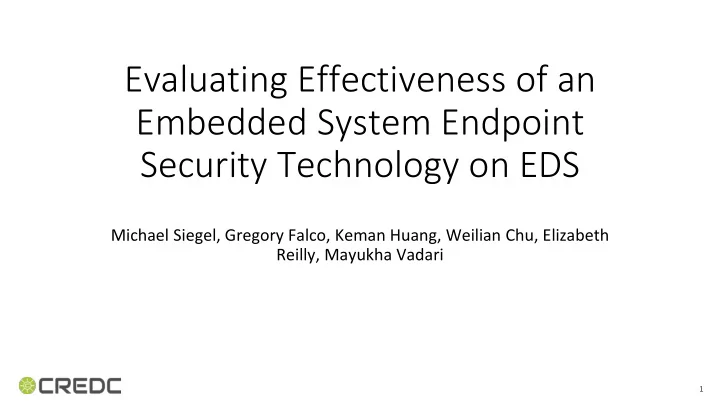

Evaluating Effectiveness of an Embedded System Endpoint Security Technology on EDS Michael Siegel, Gregory Falco, Keman Huang, Weilian Chu, Elizabeth Reilly, Mayukha Vadari 1
Digitization of Industrial Sector ● Increased demand on utilities industry ● More optimized distribution required ● Digitization of system endpoints ● Two-way communication between consumer & distributor
Industrial IoT Endpoint Devices ● Single user device, interacts with larger system of devices ● Interacts with people, usually has IP address ● Smart meters, gas pipes, oil tanks, wind turbines ● Vulnerable to malicious access & tampering
Example - Automated Gas Storage Tank ● Protocol & port # available ● Exact address ● Database information & timestamp
Example - Automated Gas Storage Tank ● ASN revealed ● Many devices have open SSH ports that allow for public access ● IP address vulnerable to ssh entry through password crackers
Consequences of Security Compromise ● Information & power theft ● Possibility of malicious control ● Disruption of distribution service to consumers ● Physical and technological infrastructure damage ● User security compromised
Why are Industrial IoT ● Certificate Verification endpoints hard to secure? • Can’t defend against users with malicious intent • Industrial endpoints low in ● Encrypted IoT network memory and storage • Not enough computation power for conventional IoT security measures
Our Project - Overview Lightweight Security Architecture Blockchain Server
Lightweight Security Architecture ● Software enforce security policies from within device ● Written in C & Bash ● Lock down endpoint OS to limit its capabilities ● Prevents unauthorized programs from running in OS ● Small footprint -> works within the kernel -> doesn’t require network access ● Intensive computations are performed in the cloud
Blockchain Technology ● Foundation for command & control ● Sends security updates, stores them in secure & decentralized channel ● Provided by Bitcoin Blockchain ● Controls applications that are black/whitelisted ● Does not interfere with firmware -> no system downtime during updates
Project Demo: Mirai ● Mirai is a famous malware botnet that targets Linux routers ● Ran open source software OpenWRT on linux virtual machine to simulate a router ● Compiled our security software and installed onto OpenWRT VM ● Attempted to run Mirai botnet on the VM
Project Demo: Mirai Blockchain ● Software constantly checks for traces of Mirai ● Software has kernel privilege within OS ● Any process outside core system is Mirai verified over blockchain Software ● Any program that doesn’t pass through the black/whitelist is killed Kernel
Timeline - Future goals Dec 2017 March 2018 April 2018 May 2018 Vestibulum congue Port existing software Run software on smart Vestibulum congue Clustering algorithms to Port software onto tempus onto router meters detect malicious IP tempus Windows-based devices addresses Lorem ipsum dolor sit amet, Lorem ipsum dolor sit amet, Software updates via Develop heuristics for consectetur adipiscing elit, sed consectetur adipiscing elit, sed VPN machine learning do eiusmod tempor. do eiusmod tempor. analysis
Industry Partners
http://cred-c.org @credcresearch facebook.com/credcresearch/ Funded by the U.S. Department of Energy and the U.S. Department of Homeland Security
Recommend
More recommend